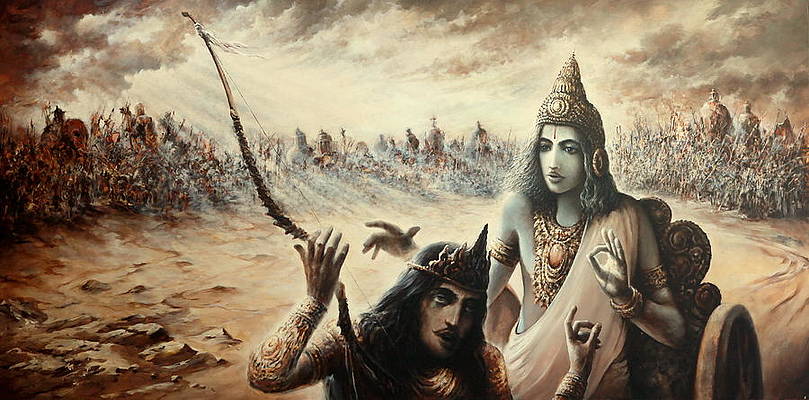Adhiyaye 1 (8/8)

Gobind Gita Translation continued...
If you are new to this series, please read the preface & the previous sections here.
In this last section of the first adhiyaye, Arjun is finishing off a thought: killing family/destroying your lineage is a bad move. Arjun decides that he won't pick up any weapons to fight his own family. Sanjay narrates this to Raja Dhritarashtra as it is happening. Sanjay implies that Sri Krishna Ji will be replying to Arjun's thoughts next. Dhan Dhan Guru Gobind Singh Ji Maharaj end of with a chaupaee to seal off the adhiyaye.
Mangal Chhand continued:
ਜੋ ਨਾਸ ਕੁਲ ਕਾ ਕਰੈ ॥
Whoever destroys their lineage...
(Jo Naas Kul Kaa Karai; Kul could refer to family/lineage/ancestry)
ਸੋ ਨਰਕ ਹੀ ਮੈ ਪਰੈ ॥
..they are destined to fall into hell
(So Narak Hee Mai Parai; in the last section, Arjan reflects on all the associated deeds such as unfaithfulness, throwing society into chaos... so this hell is a living one but this does not necessarily rule out other realms of punishment; "Hee" can inform certainty)
ਇਉ ਸੁਨਿਓ ਸਿੰਮ੍ਰਿਤ ਮਾਹਿ ॥
This is what I heard in the Simritees...
(Eio[u] Sunio Si[n]mrit Maah[i]; smriti are texts which are not direct divine revelation [shruti]... they are rather human construction/interpretation, smriti also refers specifically to dharam shastras)
ਕੁਲ ਹਤਿਆ ਨਰਕੇ ਜਾਹਿ ॥੫੭॥
...that killing your family/lineage will lead to going to hell
(Kul Hatiaa Narakae Jaah[i])
ਦੋਹਰਾ ॥ Doharaa:
ਅਬ ਅਰਜਨ ਐਸੋ ਕਹੈ ਦੇਖੋ ਹਮ ਕਿਆ ਕੀਨ ॥
Now Arjan says the following (Ab Arjan Aiso Kahai): Look at what I have done...(Daekho Ham Kiaa Keen)
ਜਬ ਇਹ ਉਦਮ ਹਮ ਕੀਓ ਸ੍ਰਬ ਪਾਪ ਹਮ ਲੀਨ ॥੫੮॥
...if I had I put in the effort & followed through (Jab Eih Oudam Ham Keeo)
I would have become connected to all these sins (Srab Paap Ham Leen; can interpret this doharaa as being written in foresight as Arjan has not killed any family member... yet)
ਦੋਹਰਾ ॥ Doharaa:
ਸਾਜਨ ਹਤੇ ਨ ਸੂਰਮਤ ਸਨਮੁਖ ਹੋਵੋ ਨਾਹਿ ॥
To kill a loved one is not within a warrior's mindset (Saajan Hathae Na Soormath) ... This is not the right path/obedient way according to my traditional knowledge (Sanmukh Hovo Naah[i]; sanmukh means to face someone, usually facing the right path or with the right guidance, sanmukh could mean obedient or otherwise facing Guru Sahib & Their Bachan)
ਸਸਤ੍ਰ ਹਾਥ ਨ ਪਕੜਹੋ ਜੇ ਕੈਰਵ ਹਤ ਜਾਹਿ ॥੫੯॥
I will not wield any weapons (Sastr Haath Na Pakrhhaho) if it is for killing the Kauravs (Jae Kairav Hath Jaah[i]; Kaurav's are his family!)
ਦੋਹਰਾ ॥ Doharaa:
ਮੁਝਕੋ ਜਬ ਇਹ ਹਤੇਗੇ ਤਬ ਮੇਰੀ ਕਲਿਆਨ ॥
[As a result] after they kill me (Mujhko Jab Eih Hathaegae) then I will experience Kalyaan (Tab Maeree Kaliaanl; meaning it's better that his family kill Arjan than Arjan having to get the sin and associated sins from killing his family)
ਇਹੁ ਸੰਗ੍ਰਾਮ ਮੈ ਨ ਕਰੌ ਛੋਡ ਰਾਜ ਅਭਿਮਾਨ ॥੬੦॥
I will not participate in this war (Eih[u] Sa[n]graam Mai Na Karau)
and I renounce the pride in ruling (Chhod Raaj Abhimaan)
ਸੰਜਿਓਵਾਚ ॥ Sanjay’s Bachans:
ਸੋਰਠਾ ॥ Sorattaa:
ਧ੍ਰਿਤਰਾਸ਼ਟ੍ਰ ਕੈ ਪਾਸ ਐਸੇ ਸੰਜੇ ਆਖ ਹੈ ॥
Addressing Raja Dhritarashtra (Dhritraashtr Kai Paas) Sanjay said the following: (Aisae Sa[n]jae Aakh Hai; now it takes a step back and we go back to the narrators)
ਸੁਨੋ ਰਾਜਨ ਅਰਦਾਸ ਪਾਂਡਵ ਕਹੈ ਯਿਉ ਕ੍ਰਿਸਨ ਪੈ ॥ ੬੧॥
Listen to this Plea/Request (Sun Raajan Ardaas; Sanskrit: Ard means to beg... Aash means desire/Farsi: a plea/request) Arjun does to Sri Krishna Ji (Paa[n]dav Kahai Yio[u] Krisan Pai; Here, Sanjay refers to Arjun as that Pandav)
ਸੋਰਠਾ ॥ Sorattaa:
ਪਾਂਡਵ ਬਹੁ ਦੁਖ ਸਾਥ ਰੁਦਨ ਕਰੇ ਹੈ ਨੈਨ ਸੋ ॥
Arjun has a lot of pain with him (Paa[n]dav Bahu Dukh Saath) for he is crying with tears pouring from his eyes (Rudhn Karae Hai Nain So)
ਧਨੁਖ ਹਾਥ ਸੌ ਡਾਰ ਸੋਕ ਸਮੁੰਦ੍ਰ ਮੈ ਬਹੁ ਗਇਆ ॥੬੨॥
Arjun put away his bow from his hand (Dhhanukh Haathh Sau Daar)
he has dived into the ocean of grief (Sok Samu[n]dr Mai Bahu Gaeiaa)
ਦੋਹਰਾ ॥ Doharaa:
ਮੂਰਛ ਹੋ ਕਰਿ ਗਿੜ ਪੜਾ ਅਰਜਨ ਰਥ ਕੇ ਮਾਹਿ ॥
Becoming unconscious, Arjun has fallen down (Moorachh Ho Kar[i] Girrh Parrhaa) inside the Chariot (Arjan Rathh Kae Maah[i])
ਆਗੈ ਮਧਸੂਦਨ ਕਹੈ ਸੁਨਹੋ ਰਾਜਾ ਤਾਹਿ ॥੬੩॥
Following this, Sri Krishna Ji replies to him (Aagai Madhhsoodhan Kahai)
Arjun is listening to him or Sanjay says Oh King Dhritarashtra listen to Sri Krishna Ji's Bachans (Sunho Raajaa Taahi; this could be understood as both)
ਟੀਕਾਕਾਰ ਵਾਚ ॥ Dhan Guru Gobind Singh Ji’s Bachan as the Teekaakaar (Commentator):
ਚੌਪਈ ॥ Chaupaee:
ਗੀਤਾ ਮੁਕਤਿ ਸਰੂਪ ਕਾ ਧਿਆਉ ॥
Focus/Concentrate on this Gita as the Form of Liberation (Geethaa Mukat[i] Saroop Kaa Dhhiaao[u])
ਅਰਜਨ ਬਿਖਿਆਦਿ ਨਾਮੁ ਚਿਤ ਲਾਉ॥
Arjan is in falsehood [don't worry about him... to avoid being in a situation like him:] engrain the Naam into your consciousness (Arjan Bikhiaadh[i] Naam[u] Chit Laao[u])
ਜੋ ਕੋ ਸੁਨਹੈ ਇਹ ਸੰਵਾਦ ॥
Whoever listens to this discussion (Jo Ko Sunahai Eih Sa[n]vaad)
ਬਰਨ ਆਸ੍ਰਮ ਤਿਸ ਆਵੈ ਸ੍ਵਾਦ ॥
No matter the caste or the distinction, you will receive the Ras [Atam Ras/Spiritual Nectar] (Baran Aasrm Tis Aavai Swaad; ashram can refer to 4 age groups: childhood, householder, banprast/forest dweller, sannyaas/renouncer)
ਦਇਆ ਕਰੇ ਸਭਹੂੰ ਕੇ ਮਾਹਿ ॥
If you are compassionate/merciful towards everyone (Daeiaa Karae Sabhahoo[n] Kae Maahi[i])
ਜਗ ਮੈ ਸੋਭਾ ਅਤਿ ਹੀ ਤਾਹਿ ॥੬੪॥
... you will receive the most glory! (Jag Mai Sobhaa Ath[i] Hee Taah[i])
ਇਤਿ ਸ਼੍ਰੀਮਦ ਭਗਵਤ ਗੀਤਾ ਸੂਪਨਿਸ਼ਸੂ ਬ੍ਰਹਮਵਿਦਿਆਯਾਂ ਯੋਗ ਸ਼ਾਸਤੇ ਸ਼੍ਰੀ ਕ੍ਰਿਸ਼ਨ ਅਰਜਨ ਸੰਵਾਦੇ ਕਰਮ ਯੋਗੋ ਪਦਮ ਪੁਰਾਣੇ ਸਤੀ ਈਸਰ ਸੰਵਾਦੇ ਉਤਰਖੰਡੇ ਗੋਬਿੰਦ ਸਿੰਘ ਕ੍ਰਿਤੇਅਰਜਨ ਵਿਸ਼ਾਦ ਯੋਗੋ ਨਾਮ ਪ੍ਰਥਮੋ ਧਿਆਇ॥੧॥੬੪॥
This is where we end the first adhiyaye of Srimad Bhagavad Gita written by Dhan Dhan Guru Gobind Singh Ji Maharaj.
(Ith[i] Shreemadh Bhagavat Geetaa Soopanishasoo Brahmvidhiaayaa[n] Yog Shaastrae Sri Krishn Arjan Sa[n]vaadhae Karam Yog Padam PuraaNae Sathee Eesar Sa[n]vaadae Outharkha[n]dae Gobi[n]d Si[n]gh Kritae Arjan Vishaadh Yogo Naam Prathhmo Dhiaae[i]; did not explain all because not within daas understanding all different Yog references)
–
We aren't done with this adhiyaye just yet. With Kirpa, daas is going to write a summary of the first adhiyaye before beginning the second adhiyaye. This reflection is really important as it allows us to proofread, check for inconsistencies, and confirm the narrative based on other versions of the Gita. Please make sure to read the reflection before moving on to the 2nd adhiyaye.
Forgive me for all the mistakes I make. With Kirpa, we have made it this far. May Maharaj bless us with the translations of the next 17 adhiyayes.
~Aaeenaa

